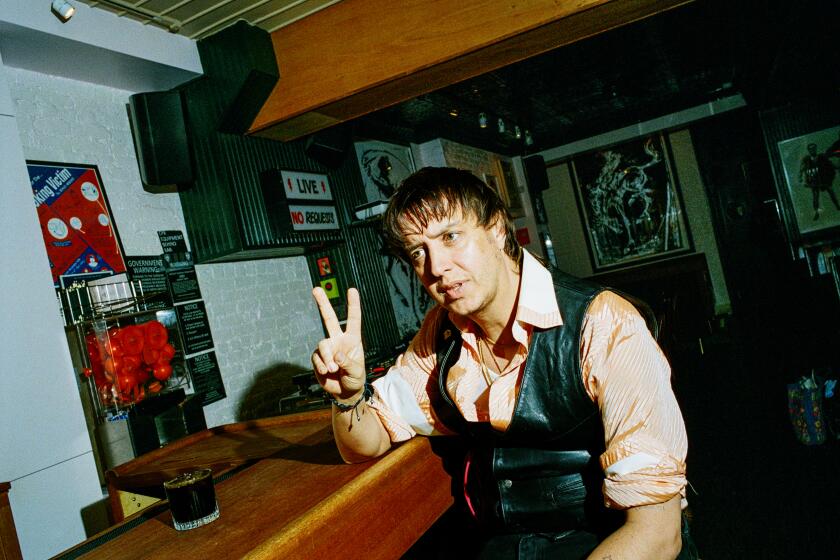AUSSIE BAND ZEROES IN ON SEXUALITY
When Hunters & Collectors came on a musical safari to Los Angeles in 1983, the Australian group presented a strange hybrid of styles and moods, an avant-rock excursion into psychic and sonic confusion.
Apparently the confusion wasn’t only in the music. Though the band received a strong reaction at the time, H&C; was going through an internal struggle that resulted in two founding members leaving it when they returned home.
The band had formed in Melbourne in 1981 as a large, funky ensemble that invited audience members on stage to bang “found” percussion. The group released two EPs before making a short-lived and ill-fated move to London, where it was signed to Virgin Records.
But the band’s insistence on live performance as a source of musical inspiration didn’t sit well with Virgin, while the group’s eccentric musical collages finally proved alien to its American label, A&M;, which dropped it after releasing one compilation album. By the time the group released “Jaws of Life” on Slash in 1984, many American fans assumed Hunters & Collectors had disbanded.
That’s why the new “Human Frailty” album (on I.R.S.) comes as a surprise. This strong, cohesive and sometimes nightmarish look at personal relationships documents a band playing at the peak of its collective power.
Mark Seymour, singer, guitarist and primary voice for the seven-piece group, considers “Human Frailty” a new beginning for the band, which plays the Roxy tonight and Sunday, then hits Orange County for shows Tuesday at the Kiss Club in Newport Beach and Thursday at the Coach House in San Juan Capistrano.
“I’ve got a much stronger sense of belief about what we’re doing than I did with our earlier music,” he said in an interview at the I.R.S. office this week.
“Our earlier music was a lot more oriented toward some sort of mysterious idea we had about what the English market was like, so it was very eclectic and obscure and based on cross-referencing all sorts of weird symbolism. They called it ‘post-nuclear funk,’ which to me sounds very pretty but it doesn’t really mean very much.”
What means a lot to Seymour and his band is playing live. Unlike many groups who create their songs in the cloistered security of a recording studio, the Hunters are dedicated to being a “pub band.”
“Most of the times we write songs at sound checks,” Seymour claimed. “When you’re on a stage, in a pub, in a space you’re going to play the songs in, they take on a completely different significance in that environment. So our songs tend to take shape in that environment.
“Rock ‘n’ roll and pubs are a tradition in Australia,” he noted. “If you can’t get up there and deliver, you’re not going to be up there for very long. You’re contracted to play for 75 minutes and you’ve got to tell the audience about every aspect of life that you can explain to these people in the shortest time. So it’s gonna come across really hard .”
This harshness translates into some of the more graphic imagery in “Human Frailty.” The first song, “Say Goodbye,” mixes pounding drums and blaring brass with the tale of a woman aggressively humiliating her simpering lover.
“We get a whole range of people when we play pubs,” Seymour noted, “gays, straights, people who approach their sexuality in completely different ways. I got sick of the traditional myth that was invented in the ‘70s about how heterosexual males were responsible for everything that went wrong in relationships.
“I wanted to have a song with the most controversial of the post-’70s cries of despair--namely when the woman turns and emasculates the guy and he doesn’t know anymore whether he should leap on top of her or ask her politely to make love and she turns to him and says, ‘You don’t make me feel like a woman anymore!’ To hear a chorus of heterosexual men all singing this together in a pub, to me, was a perfect irony. When that happened I felt we had finally made a statement that people could relate to.”
A lot of Australians are relating to “Human Frailty,” which is already a gold record Down Under and has produced several singles. One, “Throw Your Arms Around Me,” will come as a shock to those who remember the old group. It’s a tender, romantic pop song.
“I think pop music is the music that relates to people’s most fundamental sense of themselves,” said Seymour. “It’s a yardstick of people’s experience. That’s what reaches their emotional life. We’re trying to create a sense of what life is now--how it’s immediate, very transient, very throwaway.”
More to Read
The biggest entertainment stories
Get our big stories about Hollywood, film, television, music, arts, culture and more right in your inbox as soon as they publish.
You may occasionally receive promotional content from the Los Angeles Times.








